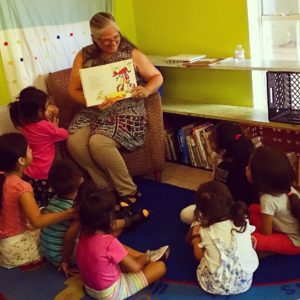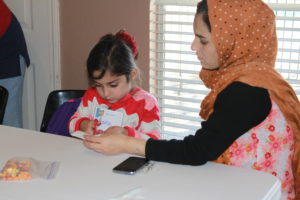There was plenty of outrage to go around in mid-June when news of President Trump’s zero-tolerance policy broke across the nation and the world.
Non-stop images of infants, toddlers and other youth being ripped from their loved ones’ arms generated frustration in those who wanted to help, but didn’t know how.
But Lisa Sandoz Robinson knew what to do about it: get into action.

Lisa Robinson teaches literacy skills to immigrant children. (Photo/Courtesy of Lisa Robinson)
“It’s not just about praying and giving money,” said Robinson, a former attorney and educator and a deacon at Willow Meadows Baptist Church, a Cooperative Baptist Fellowship congregation in Houston, Texas.
Nonprofit and religious leaders in the region say getting involved, however that looks, is a healthy response to difficult news.
Sometimes that might mean giving money. One border-area nonprofit reported a $15-million spike in donations to help immigrant families affected by the policy.
Ministry, even away from the main action, is needed, one expert said.
“It’s imperative to reach out to immigrants because they are coming and they don’t have a lot of resources, especially if they are undocumented,” said Butch Green, CBF field personnel who helps coordinate literacy efforts for refugee and immigrant families in Houston.
Robinson said her on-going participation in that literacy program, called Ready for School, has helped her through the emotions evoked by the treatment of families at the border.
It’s also an example of how ministry in one place can address injustice elsewhere.
“For me, it’s about showing these children and their caregivers that I love them, and through me God loves them,” Robinson said. “To me, that’s what it’s all about.”
Ready for School is an outreach of Literacy ConneXus, a Fort Worth nonprofit that equips churches and other grassroots groups to address literacy needs in their communities.
The curriculum was created by a team that includes Karen Morrow, CBF field personnel for refugees based in Fort Worth.

Karen Morrow
ConneXus has relationships with several CBF volunteers and congregations in Texas, and also in North Carolina. Its offices are located at Agape Baptist Church, a CBF partner congregation.
Ready for School was initially launched to serve the children of refugee families who are legally resettled in the state, Morrow said.
The five-year-old program runs 20 weeks and is designed to prepare pre-K children for entry into American schools and life.
The programs are held at apartment complexes where the client families live. The free, downloadable curriculum is designed to help volunteers train parents to become teachers and to help youth to adjust to the culture and behaviors peculiar to American society, Morrow said.
For some, that may require learning how to stand in line and how to use running water, she said. It also touches on math, motor skills, social acclimation and parenting.
The program helps students build their own home libraries.
“The key is for the kids to learn that words have meaning, to read left-to-right, to turn pages – all the literacy concepts I did naturally with my children,” Morrow said.
Green, who with his wife Nell serves refugees in the Houston area, said CBF churches and individuals there have used Ready for School to serve refugee families.

Butch Green
But Willow Meadows Baptist Church has partnered with a local YMCA chapter to apply the program to immigrant children, Green said. The partnership just finished its first session of the program.
“I think it worked very smoothly for the immigrant population because they are pretty much in the same situation (as refugees),” he said.
While the program is not a religious one, it does feel and function like ministry, Robinson said. For her, it’s a way to live out a calling.
“I feel God is blessing that time and allowing these families to know that, yes, it’s safe in that YMCA apartment,” she said.
The Willow Meadows and YMCA effort is held in an apartment unit the non-profit group rents to provide other services to immigrants.
“It’s not providing food and shelter and clothing,” she said. “But providing literacy and a love of books and a love of learning is just as important. It’s helping them communicate better in American society.”

A refugee mother and her child participate in Ready for School. (Photo/Courtesy of Karen Morrow)
Robinson said she hopes the program catches on with other churches and volunteers as a way they can get involved in reaching out to immigrants.
The plight of immigrants at the U.S. border and beyond has also compelled her to participate in marches, organize discussions and volunteer at a respite center for immigrants in the border town of McAllen, Texas, which her congregation supports.
There are many ways to help immigrants, she said.
“This is human rights. This is humanitarian work,” she said.
